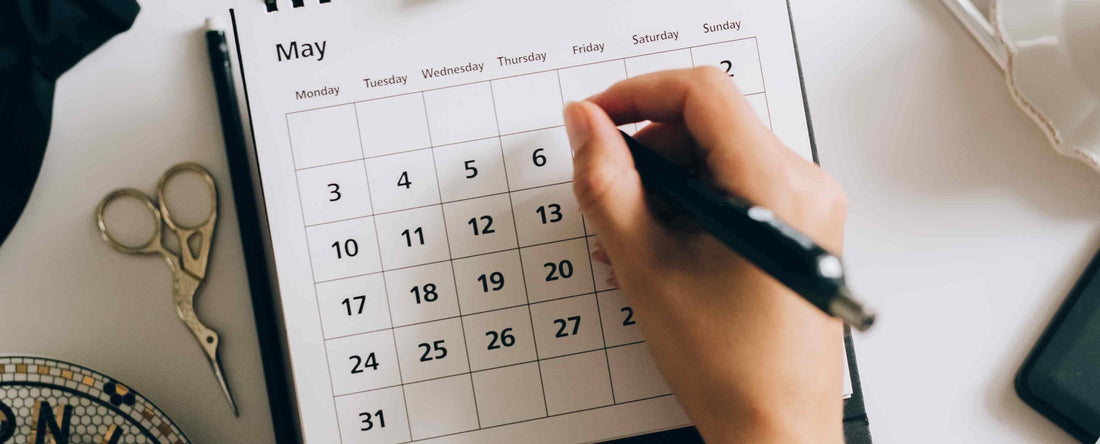The 21-Day Challenge to Train Your Body to Wake Up Early

Waking up early in the morning is a struggle for many people. Hitting the snooze button repeatedly and dragging yourself out of bed can lead to a sluggish start to the day, affecting your productivity and mood. However, with a little effort, you can train your body to wake up early and feel energised throughout the day. One way to achieve this is by taking up the 21-Day Challenge, which involves setting a goal to wake up at the same time every day for 21 consecutive days. This blog will discuss the benefits of waking up early and how to take up the 21-Day Challenge to become an early riser.
The Benefits of Waking Up Early

Waking up early has numerous benefits for your health, productivity, and overall well-being.
Increased Productivity
Waking up early gives you more time in the day to accomplish your tasks. When you wake up early, you're less likely to rush through your morning routine, which can help you start your day positively. Additionally, research has shown that individuals who wake up early are more proactive and productive throughout the day.
Better Sleep Quality
When you wake up early, you're more likely to establish a consistent sleep schedule, which can help improve your sleep quality. In addition, studies have shown that individuals who wake up early have a more regular sleep pattern, which can lead to better sleep quality and overall health.
Improved Mood
Waking up early can also improve your mood. When you wake up early, you're less likely to feel rushed or stressed, which can help you start your day positively. Additionally, research has shown that individuals who wake up early are more optimistic and satisfied with their lives.
More Time for Exercise
Waking up early gives you more time to exercise, which can have numerous health benefits. Studies have shown that individuals who exercise in the morning have more energy throughout the day and are likelier to stick to their fitness routines.
Reduced Stress
Waking up early can help reduce stress. When you wake up early, you're less likely to feel rushed or overwhelmed, which can help you start your day positively. Additionally, research has shown that individuals who wake up early tend to have lower cortisol levels, a hormone associated with stress.
The 21-Day Challenge

The 21-Day Challenge is a simple and effective way to train your body to wake up early. The Challenge involves setting a goal to wake up at the same time every day for 21 consecutive days. By doing this, you're training your body to establish a consistent sleep schedule, which can benefit your health and productivity.
Here are some tips to help you succeed in the 21-Day Challenge:
Set a consistent wake-up time: Choose when you want to wake up every day, even on weekends. Stick to this schedule for 21 consecutive days.

Setting a consistent wake-up time is one of the most important aspects of the 21-Day Challenge to train your body to wake up early. When you wake up at the same time every day, even on weekends, you're training your body to establish a consistent sleep schedule, which can have numerous benefits for your health and productivity.
When you wake up at the same time every day, your body becomes accustomed to the routine, and your internal clock adjusts accordingly. This means that you'll naturally start to feel sleepy at the same time every night and wake up feeling rested and energised in the morning.
However, sticking to a consistent wake-up time can be challenging, especially if you're used to sleeping in on weekends or staying up late at night. Here are a few tips to help you establish a consistent wake-up time:
-
Choose a wake-up time that works for you: When choosing a wake-up time, consider your work schedule, family responsibilities, and personal preferences. Choose a time that allows you to get enough sleep and fits into your daily routine.
-
Gradually adjust your wake-up time: If you're used to waking up late, don't try to wake up early suddenly. Instead, gradually adjust your wake-up time by 15-30 minutes every day until you reach your desired wake-up time.
-
Don't hit snooze: Hitting snooze repeatedly can disrupt your sleep and make it difficult to establish a consistent wake-up time. Instead, get up as soon as your alarm goes off and start your day.
-
Create a motivating morning routine: Create a morning routine that motivates you to get out of bed. This could include exercise, meditation, reading, or spending time with your family.
-
Stick to your wake-up time on weekends: While it's tempting to sleep in on weekends, sticking to your wake-up time can help you maintain a consistent sleep schedule and wake up feeling rested.
Establish a consistent bedtime: To ensure you get enough sleep, establish a consistent bedtime that allows for at least seven to eight hours of sleep every night.

Establishing a consistent bedtime is crucial to training your body to wake up early. It's essential to ensure that you get enough sleep to wake up feeling rested and energised, which is why you need to establish a consistent bedtime that allows for at least seven to eight hours of sleep every night.
When you have a consistent bedtime, you help regulate your body's circadian rhythm, which is the internal clock that controls your sleep-wake cycle. This helps your body know when it's time to go to sleep and wake up, making it easier to fall asleep and wake up feeling rested.
Here are a few tips to help you establish a consistent bedtime:
-
Determine how much sleep you need: The amount of sleep you need varies depending on your age, lifestyle, and health. As a general rule, most adults need seven to eight hours of sleep every night. Determine how much sleep you need and aim to get that amount every night.
-
Establish a bedtime routine: Establishing a relaxing bedtime routine can help signal to your body that it's time to wind down and prepare for sleep. Your bedtime routine can include activities like reading, taking a bath, or meditating.
-
Avoid stimulating activities before bed: Avoid activities that stimulate your brain before bed, such as working on your computer, watching TV, or scrolling through social media. These activities can interfere with your ability to fall asleep and disrupt your sleep quality.
-
Create a sleep-conducive environment: Your sleep environment should be dark, cool, and quiet. Use blackout curtains, earplugs, or a white noise machine to create a sleep-conducive environment that promotes restful sleep.
-
Stick to your bedtime every night: Consistency is key when it comes to establishing a bedtime. Stick to your bedtime every night, even on weekends, to help regulate your body's circadian rhythm.
Avoid caffeine and alcohol before bed: Both caffeine and alcohol can disrupt your sleep and make it difficult to wake up early.

Caffeine is a stimulant that can keep you awake and alert, making it difficult to fall asleep. It can also interfere with the quality of your sleep by reducing the amount of time you spend in deep sleep, the stage of sleep that's most restorative. If you're sensitive to caffeine, it's best to avoid it entirely in the afternoon and evening.
Alcohol, on the other hand, can make you feel drowsy and help you fall asleep quickly, but it can also disrupt the quality of your sleep. Alcohol can interfere with your body's ability to enter into deep sleep and REM (rapid eye movement) sleep, the stage of sleep associated with dreaming. As a result, you may wake up feeling groggy and unrefreshed, even if you've slept for the recommended seven to eight hours.
Here are a few tips to help you avoid caffeine and alcohol before bed:
-
Limit caffeine intake: If you're sensitive to caffeine, limit your intake or avoid it entirely in the afternoon and evening. Be mindful of hidden sources of caffeine, such as chocolate, tea, and some medications.
-
Avoid alcohol before bed: Avoid consuming alcohol within three hours of bedtime to allow time for your body to metabolise it. Consider limiting your alcohol intake to improve the quality of your sleep.
-
Drink herbal tea: Instead of caffeine, try drinking herbal tea before bed. Chamomile tea, in particular, is known for its calming effects and can help promote restful sleep.
-
Stay hydrated: Make sure to stay hydrated throughout the day, but avoid drinking too much water before bed to reduce the likelihood of waking up to use the bathroom.
Create a relaxing bedtime routine: Develop a comfortable bedtime routine that helps you unwind and prepare for sleep. It could include reading, taking a bath, or meditating.

Creating a relaxing bedtime routine is a great way to prepare your mind and body for sleep. A bedtime routine helps signal to your brain that it's time to wind down and relax, making it easier to fall asleep and achieve restful sleep. Here are some tips to create a relaxing bedtime routine:
-
Plan ahead: Take some time to plan your bedtime routine. Consider what activities help you relax and unwind. Create a routine that's simple and easy to follow, so you're more likely to stick with it.
-
Set a consistent bedtime: As we mentioned earlier, setting a consistent bedtime helps regulate your body's circadian rhythm. Try to go to bed at the same time every night, even on weekends.
-
Avoid screens: The blue light emitted by screens can interfere with your body's ability to produce melatonin, the hormone that regulates sleep. Try to avoid screens for at least an hour before bedtime.
-
Dim the lights: Dimming the lights in your bedroom can help signal to your brain that it's time to sleep. Consider installing dimmer switches or using low-wattage bulbs.
-
Take a warm bath: A warm bath can help you relax and unwind. The rise in body temperature followed by the drop in temperature after getting out of the bath can also help promote restful sleep.
-
Practice relaxation techniques: Meditation, deep breathing, and progressive muscle relaxation are all relaxation techniques that can help you fall asleep faster and sleep more soundly.
-
Read a book: Reading a book can help you unwind and take your mind off the day's stressors. It can also help tire your eyes, making it easier to fall asleep.
-
Listen to calming music: Listening to calming music can help you relax and fall asleep faster. Consider creating a playlist of soothing music to listen to before bed.
Try B-SYNC ON

B-SYNC ON is a dietary supplement designed to support and improve your wake-up process. Its all-natural ingredients, including Vitamin B5, Vitamin B12, Zinc, and Caffeine, are stored in a delayed-release capsule. Taking B-Sync ON at bedtime gradually releases energising nutrients shortly before you wake up, resulting in a gradual and effortless wake-up experience. Using B-Sync ON can help you wake up feeling refreshed and energised, ready to tackle the day ahead. So, add B-SYNC ON to your wake-up routine and experience the benefits of a more natural, gentle wake-up process.
Conclusion
Remember, the 21-day challenge is all about establishing a consistent sleep schedule. By doing so, you'll be training your body to wake up early naturally. It may take some time to adjust, but the benefits are worth it. In conclusion, waking up early can have numerous benefits for your health and productivity. The 21-day challenge is a simple and effective way to train your body to wake up early. By setting a consistent wake-up time, establishing a consistent bedtime, avoiding caffeine and alcohol before bed, creating a relaxing bedtime routine, and using an alarm clock, you'll be on your way to becoming an early riser in no time.
References
- https://www.hopkinsmedicine.org/health/wellness-and-prevention/the-benefits-of-a-consistent-wake-up-time.
- https://www.cdc.gov/sleep/about_sleep/sleep_hygiene.html.
- https://www.sleepfoundation.org/alcohol-and-sleep/how-does-alcohol-affect-sleep.
- https://www.sleepfoundation.org/caffeine-and-sleep.
- https://www.nccih.nih.gov/health/relaxation-techniques-for-health-an-introduction.
- https://www.sleepassociation.org/about-sleep/sleep-hygiene/.
- https://www.mayoclinic.org/healthy-lifestyle/adult-health/in-depth/sleep/art-20048379.
- https://www.pcmag.com/picks/the-best-alarm-clocks.
- https://cms.wellcome.org/sites/default/files/2022-07/MH-Sleep-Report-Wellcome-07.2022.pdf







